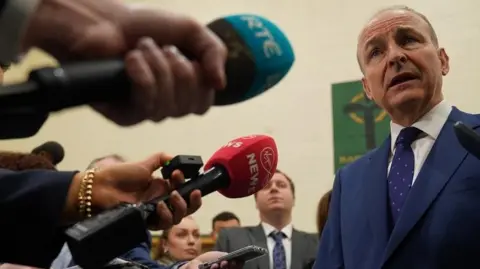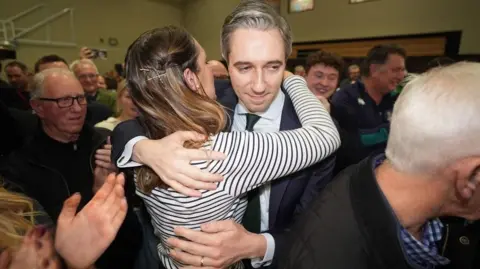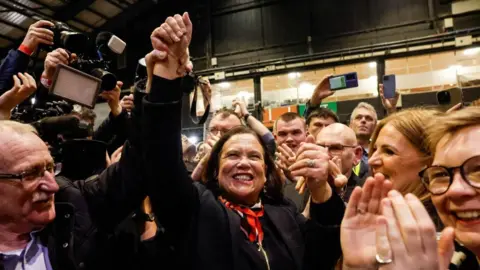Irish government parties buck worldwide election trend
 PA Media
PA MediaAs the complex counting continues, unpredictability has given way to clarity in Ireland’s election.
It looks like the country has bucked the trend across the world, in a year of numerous elections, by putting the outgoing centrist government parties in prime position to go back into power.
There is a now frontrunner to be prime minister, known as the taoiseach – Michéal Martin of Fianna Fáil.
His party has won the biggest number of first preference votes, and is on course to win the most seats for the second election in a row.
 PA Media
PA MediaAfter the exit poll, Sinn Féin had hoped it would repeat its achievement of 2020 and win the popular vote and also become the largest party in the Irish parliament for the first time.
But party figures were less keen to play up their chances as the declarations rolled in late on Saturday evening.
Sinn Féin eventually came third in the race for first preferences with a 5.5% drop in its share compared with four years ago.
Analysts are projecting that the centre-right parties of Fianna Fáil and Fine Gael will win more than 80 seats between them – putting them close to the “finish line” of 88, which is an overall majority in the lower house of parliament, Dáil Éireann.
Sources in both parties suggest they will seek a coalition deal with one or two centre-left parties – potentially Labour and the Social Democrats, which have both grown their support.
The Green Party, which was the third member of the last government, has had a tough election, with leader Roderic O’Gorman looking like he could be the only survivor when the final seat tally arrives.
Sinn Féin sources have suggested that the potential wipeout of another junior coalition partner could dissuade left-wing parties from going into government with Fianna Fáil and Fine Gael again.
But it looks all but certain that the Sinn Féin president, Mary Lou McDonald, will be leader of the opposition for another parliamentary term.
 Reuters
ReutersThe outgoing taoiseach, Simon Harris of Fine Gael, has only been in the job for seven months.
He could return to the position in a couple of years, if his party and Fianna Fáil repeat their 2020 deal to have a “rotating taoiseach”.
Whether and how that issue will come into play may depend on how many more seats are secured by Michéal Martin’s party.
Fine Gael will be in government for an unprecedented fourth successive term.
The electorate has apparently opted for continuity and stability overall.
 Reuters
ReutersBut there was a chaotic moment when a particularly controversial candidate arrived at the main count centre in Dublin– to a clatter of camera clicks and an array of shouted questions from journalists.
The media “scrum” around Gerard Hutch was possibly the most intense of the weekend.
Hutch was cleared of murdering a man during a boxing weigh-in at a Dublin hotel in 2016, but a judge described him as the patriarchal figurehead of a criminal organisation and said he engaged in serious criminal conduct.
Last month, he was released on bail from custody in Spain, where he had been arrested as part of an investigation into money laundering by the Hutch Organised Crime Group.
He was well in contention for a seat in Dublin Central – but was eventually overtaken by Labour’s Marie Sherlock.
